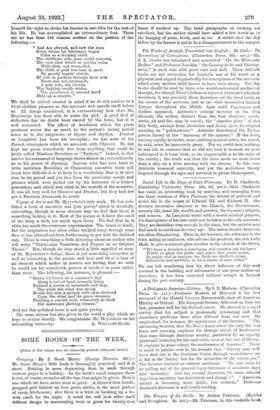The Works of Aristotle Translated into English : De Caelo
: De Generations et Corruptions. (Clarendon Press. 10s. net.)—Mr. J. L. Stocks has translated and annotated "On the Heavenly Bodies" and Professor Joachim " On Coming-to-be and Passing- away," in each case with great care and skill. These difficult books are not attractive, for Aristotle was at his worst as a physicist and argued dogmatically for conceptions of the universe which every modern child knows to have been wrong. Yet the books should be read by those who would understand mediaeval thought, for though Plate's followers rejected Aristotle's physical doctrines, it was precisely these doctrines—of the fixed earth as the centre of the universe, and so on—that dominated learned Europe throughout the Middle Ages until Copernicus and Galileo appeared. Aristotle's curious doctrine of the fifth element, the aether, distinct from the four elements, earth, water, air and fire, may be noted ; the "superior glory" of this fifth body, exempt from alteration and decay, gave its original meaning to "quintessence." Aristotle demolished the Pytha4 gore.an theory of the "harmony of the spheres." If the stars, moving rapidly in circles, were emitting musical notes, the sound, he said, must be immensely great. Yet we could hear nothing. It was idle to contend that we did not hear it because we were habituated to it from birth, as the coppersmith is to the noise of the smithy ; the truth was that the stars made no more noise than a ship on a river moving with the stream. In this case Aristotle reasoned correctly, and yet the melodious theory lingered through the ages and survived to please Shakespeare.


































 Previous page
Previous page